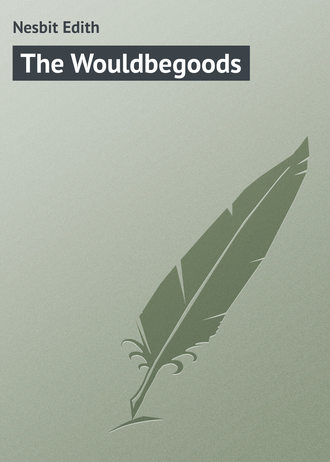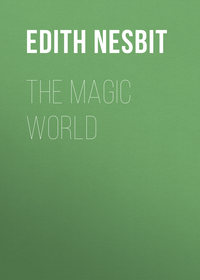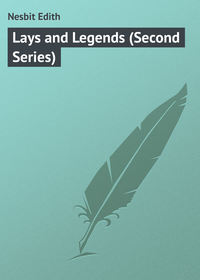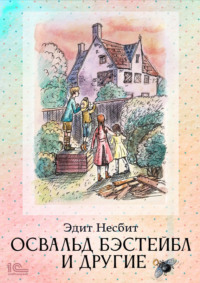 полная версия
полная версияThe Wouldbegoods
When our beaver task was performed we went on, and Dicky was so hot he had to take his jacket off and shut up about icebergs.
I cannot tell you about all the windings of the stream; it went through fields and woods and meadows, and at last the banks got steeper and higher, and the trees overhead darkly arched their mysterious branches, and we felt like the princes in a fairy tale who go out to seek their fortunes.
And then we saw a thing that was well worth coming all that way for; the stream suddenly disappeared under a dark stone archway, and however much you stood in the water and stuck your head down between your knees you could not see any light at the other end.
The stream was much smaller than where we had been beavers.
Gentle reader, you will guess in a moment who it was that said:
"Alice, you've got a candle. Let's explore."
This gallant proposal met but a cold response.
The others said they didn't care much about it, and what about tea?
I often think the way people try to hide their cowardliness behind their teas is simply beastly.
Oswald took no notice. He just said, with that dignified manner, not at all like sulking, which he knows so well how to put on:
"All right. I'm going. If you funk it you'd better cut along home and ask your nurses to put you to bed."
So then, of course, they agreed to go. Oswald went first with the candle. It was not comfortable; the architect of that dark, subterranean passage had not imagined any one would ever be brave enough to lead a band of beavers into its inky recesses, or he would have built it high enough to stand upright in. As it was, we were bent almost at a right angle, and this is very awkward if for long.
But the leader pressed dauntlessly on, and paid no attention to the groans of his faithful followers, nor to what they said about their backs.
It really was a very long tunnel, though, and even Oswald was not sorry to say, "I see daylight." The followers cheered as well as they could as they splashed after him. The floor was stone as well as the roof, so it was easy to walk on. I think the followers would have turned back if it had been sharp stones or gravel.
And now the spot of daylight at the end of the tunnel grew larger and larger, and presently the intrepid leader found himself blinking in the full sun, and the candle he carried looked simply silly. He emerged, and the others too, and they stretched their backs, and the word "Krikey" fell from more than one lip. It had indeed been a cramping adventure. Bushes grew close to the mouth of the tunnel, so we could not see much landscape, and when we had stretched our backs we went on up stream, and nobody said they'd had jolly well enough of it, though in more than one young heart this was thought.
It was jolly to be in the sunshine again. I never knew before how cold it was underground. The stream was getting smaller and smaller.
Dicky said, "This can't be the way. I expect there was a turning to the north pole inside the tunnel, only we missed it. It was cold enough there."
But here a twist in the stream brought us out from the bushes, and Oswald said:
"Here is strange, wild, tropical vegetation in the richest profusion. Such blossoms as these never opened in a frigid what's-its-name."
It was indeed true. We had come out into a sort of marshy, swampy place like, I think, a jungle is, that the stream ran through, and it was simply crammed with queer plants and flowers we never saw before or since. And the stream was quite thin. It was torridly hot and softish to walk on. There were rushes and reeds and small willows, and it was all tangled over with different sorts of grasses – and pools here and there. We saw no wild beasts, but there were more different kinds of wild flies and beetles than you could believe anybody could bear, and dragon-flies and gnats. The girls picked a lot of flowers. I know the names of some of them, but I will not tell you them because this is not meant to be instructing. So I will only name meadow-sweet, yarrow, loose-strife, lady's bed-straw, and willow herb – both the larger and the lesser.
Every one now wished to go home. It was much hotter there than in natural fields. It made you want to tear all your clothes off and play at savages, instead of keeping respectable in your boots.
But we had to bear the boots because it was so brambly.
It was Oswald who showed the others how flat it would be to go home the same way we came; and he pointed out the telegraph wires in the distance and said:
"There must be a road there, let's make for it," which was quite a simple and ordinary thing to say, and he does not ask for any credit for it.
So we sloshed along, scratching our legs with the brambles, and the water squelched in our boots, and Alice's blue muslin frock was torn all over in these criss-cross tears which are considered so hard to darn.
We did not follow the stream any more. It was only a trickle now, so we knew we had tracked it to its source. And we got hotter and hotter and hotter, and the dews of agony stood in beads on our brows and rolled down our noses and off our chins. And the flies buzzed and the gnats stung, and Oswald bravely sought to keep up Dicky's courage, when he tripped on a snag and came down on a bramble-bush, by saying:
"You see it is the source of the Nile we've discovered. What price north poles now?"
Alice said, "Ah, but think of ices! I expect Oswald wishes it had been the pole, anyway – "
Oswald is naturally the leader, especially when following up what is his own idea, but he knows that leaders have other duties besides just leading. One is to assist weak or wounded members of the expedition, whether polar or equatorish.
So the others had got a bit ahead through Oswald lending the tottering Denny a hand over the rough places. Denny's feet hurt him, because when he was a beaver his stockings had dropped out of his pocket, and boots without stockings are not a bed of luxuriousness. And he is often unlucky with his feet.
Presently we came to a pond, and Denny said:
"Let's paddle."
Oswald likes Denny to have ideas; he knows it is healthy for the boy, and generally he backs him up, but just now it was getting late and the others were ahead, so he said:
"Oh, rot! come on."
Generally the Dentist would have; but even worms will turn if they are hot enough, and if their feet are hurting them.
"I don't care, I shall!" he said.
Oswald overlooked the mutiny and did not say who was leader. He just said:
"Well, don't be all day about it," for he is a kind-hearted boy and can make allowances.
So Denny took off his boots and went into the pool.
"Oh, it's ripping!" he said. "You ought to come in."
"It looks beastly muddy," said his tolerating leader.
"It is a bit," Denny said, "but the mud's just as cool as the water, and so soft it squeezes between your toes quite different to boots."
And so he splashed about, and kept asking Oswald to come along in.
But some unseen influence prevented Oswald doing this; or it may have been because both his bootlaces were in hard knots.
Oswald had cause to bless the unseen influence, or the bootlaces, or whatever it was.
Denny had got to the middle of the pool, and he was splashing about and getting his clothes very wet indeed, and altogether you would have thought his was a most envious and happy state. But alas! the brightest cloud has a waterproof lining. He was just saying:
"You are a silly, Oswald. You'd much better – " when he gave a blood-piercing scream, and began to kick about.
"What's up?" cried the ready Oswald; he feared the worst from the way Denny screamed, but he knew it could not be an old meat tin in this quiet and jungular spot, like it was in the moat when the shark bit Dora.
"I don't know, it's biting me. Oh, it's biting me all over my legs! Oh, what shall I do? Oh, it does hurt! Oh! oh! oh!" remarked Denny, among his screams, and he splashed towards the bank. Oswald went into the water and caught hold of him and helped him out. It is true that Oswald had his boots on, but I trust he would not have funked the unknown terrors of the deep, even without his boots. I am almost sure he would not have.
When Denny had scrambled and been hauled ashore, we saw with horror and amaze that his legs were stuck all over with large black slug-looking things. Denny turned green in the face – and even Oswald felt a bit queer, for he knew in a moment what the black dreadfulnesses were. He had read about them in a book called Magnet Stories, where there was a girl called Theodosia, and she could play brilliant trebles on the piano in duets, but the other girl knew all about leeches, which is much more useful and golden deedy. Oswald tried to pull the leeches off, but they wouldn't, and Denny howled so he had to stop trying. He remembered from the Magnet Stories how to make the leeches begin biting – the girl did it with cream – but he could not remember how to stop them, and they had not wanted any showing how to begin.
"Oh, what shall I do? What shall I do? Oh, it does hurt! Oh, oh!" Denny observed, and Oswald said:
"Be a man! Buck up! If you won't let me take them off you'll just have to walk home in them."
At this thought the unfortunate youth's tears fell fast. But Oswald gave him an arm, and carried his boots for him, and he consented to buck up, and the two struggled on towards the others, who were coming back, attracted by Denny's yells. He did not stop howling for a moment, except to breathe. No one ought to blame him till they have had eleven leeches on their right leg and six on their left, making seventeen in all, as Dicky said, at once.
It was lucky he did yell, as it turned out, because a man on the road – where the telegraph wires were – was interested by his howls, and came across the marsh to us as hard as he could.
When he saw Denny's legs he said:
"Blest if I didn't think so," and he picked Denny up and carried him under one arm, where Denny went on saying "Oh!" and "It does hurt" as hard as ever.
Our rescuer, who proved to be a fine big young man in the bloom of youth, and a farm-laborer by trade, in corduroys, carried the wretched sufferer to the cottage where he lived with his aged mother; and then Oswald found that what he had forgotten about the leeches was salt. The young man in the bloom of youth's mother put salt on the leeches, and they squirmed off, and fell with sickening, slug-like flops on the brick floor.
Then the young man in corduroys and the bloom, etc., carried Denny home on his back, after his legs had been bandaged up, so that he looked like "wounded warriors returning."
It was not far by the road, though such a long distance by the way the young explorers had come.
He was a good young man, and though, of course, acts of goodness are their own reward, still I was glad he had the two half-crowns Albert's uncle gave him, as well as his own good act. But I am not sure Alice ought to have put him in the Golden Deed book which was supposed to be reserved for Us.
Perhaps you will think this was the end of the source of the Nile (or north pole). If you do, it only shows how mistaken the gentlest reader may be.
The wounded explorer was lying with his wounds and bandages on the sofa, and we were all having our tea, with raspberries and white currants, which we richly needed after our torrid adventures, when Mrs. Pettigrew, the housekeeper, put her head in at the door and said:
"Please could I speak to you half a moment, sir," to Albert's uncle. And her voice was the kind that makes you look at each other when the grown-up has gone out, and you are silent, with your bread-and-butter half way to the next bite, or your teacup in mid flight to your lips.
It was as we supposed. Albert's uncle did not come back for a long while. We did not keep the bread-and-butter on the wing all that time, of course, and we thought we might as well finish the raspberries and white currants. We kept some for Albert's uncle, of course, and they were the best ones too; but when he came back he did not notice our thoughtful unselfishness.
He came in, and his face wore the look that means bed, and very likely no supper.
He spoke, and it was the calmness of white-hot iron, which is something like the calmness of despair. He said:
"You have done it again. What on earth possessed you to make a dam?"
"We were being beavers," said H. O., in proud tones. He did not see as we did where Albert's uncle's tone pointed to.
"No doubt," said Albert's uncle, rubbing his hands through his hair. "No doubt! no doubt! Well, my beavers, you may go and build dams with your bolsters. Your dam stopped the stream; the clay you took for it left a channel through which it has run down and ruined about seven pounds' worth of freshly reaped barley. Luckily the farmer found it out in time or you might have spoiled seventy pounds' worth. And you burned a bridge yesterday."
We said we were sorry. There was nothing else to say, only Alice added, "We didn't mean to be naughty."
"Of course not," said Albert's uncle, "you never do. Oh, yes, I'll kiss you – but it's bed and it's two hundred lines to-morrow, and the line is – 'Beware of Being Beavers and Burning Bridges. Dread Dams.' It will be a capital exercise in capital B's and D's."
We knew by that that, though annoyed, he was not furious; we went to bed.
I got jolly sick of capital B's and D's before sunset on the morrow. That night, just as the others were falling asleep, Oswald said:
"I say."
"Well," retorted his brother.
"There is one thing about it," Oswald went on, "it does show it was a rattling good dam anyhow."
And filled with this agreeable thought, the weary beavers (or explorers, polar or otherwise) fell asleep.
THE HIGH-BORN BABE
It really was not such a bad baby – for a baby. Its face was round and quite clean, which babies' faces are not always, as I dare say you know by your own youthful relatives; and Dora said its cape was trimmed with real lace, whatever that may be – I don't see myself how one kind of lace can be realler than another. It was in a very swagger sort of perambulator when we saw it; and the perambulator was standing quite by itself in the lane that leads to the mill.
"I wonder whose baby it is," Dora said. "Isn't it a darling, Alice?"
Alice agreed to its being one, and said she thought it was most likely the child of noble parents stolen by gipsies.
"These two, as likely as not," Noël said. "Can't you see something crime-like in the very way they're lying?"
They were two tramps, and they were lying on the grass at the edge of the lane on the shady side, fast asleep, only a very little further on than where the Baby was. They were very ragged, and their snores did have a sinister sound.
"I expect they stole the titled heir at dead of night, and they've been travelling hot-foot ever since, so now they're sleeping the sleep of exhaustedness," Alice said. "What a heartrending scene when the patrician mother wakes in the morning and finds the infant aristocrat isn't in bed with his mamma."
The Baby was fast asleep or else the girls would have kissed it. They are strangely fond of kissing. The author never could see anything in it himself.
"If the gipsies did steal it," Dora said, "perhaps they'd sell it to us. I wonder what they'd take for it."
"What could you do with it if you'd got it?" H. O. asked.
"Why, adopt it, of course," Dora said. "I've often thought I should enjoy adopting a baby. It would be a golden deed, too. We've hardly got any in the book yet."
"I should have thought there were enough of us," Dicky said.
"Ah, but you're none of you babies," said Dora.
"Unless you count H. O. as a baby: he behaves jolly like one sometimes."
This was because of what had happened that morning when Dicky found H. O. going fishing with a box of worms, and the box was the one Dicky keeps his silver studs in, and the medal he got at school, and what is left of his watch and chain. The box is lined with red velvet and it was not nice afterwards. And then H. O. said Dicky had hurt him, and he was a beastly bully, and he cried. We thought all this had been made up, and were sorry to see it threaten to break out again. So Oswald said:
"Oh, bother the Baby! Come along, do!"
And the others came.
We were going to the miller's with a message about some flour that hadn't come, and about a sack of sharps for the pigs.
After you go down the lane you come to a cloverfield, and then a cornfield, and then another lane, and then it is the mill. It is a jolly fine mill; in fact, it is two – water and wind ones – one of each kind – with a house and farm buildings as well. I never saw a mill like it, and I don't believe you have either.
If we had been in a story-book the miller's wife would have taken us into the neat sanded kitchen where the old oak settle was black with time and rubbing, and dusted chairs for us – old brown Windsor chairs – and given us each a glass of sweet-scented cowslip wine and a thick slice of rich home-made cake. And there would have been fresh roses in an old china bowl on the table. As it was, she asked us all into the parlor and gave us Eiffel Tower lemonade and Marie biscuits. The chairs in her parlor were "bent wood," and no flowers, except some wax ones under a glass shade, but she was very kind, and we were very much obliged to her. We got out to the miller, though, as soon as we could; only Dora and Daisy stayed with her, and she talked to them about her lodgers and about her relations in London.
The miller is a MAN. He showed us all over the mills – both kinds – and let us go right up into the very top of the wind-mill, and showed us how the top moved round so that the sails could catch the wind, and the great heaps of corn, some red and some yellow (the red is English wheat), and the heaps slide down a little bit at a time into a square hole and go down to the millstones. The corn makes a rustling, soft noise that is very jolly – something like the noise of the sea – and you can hear it through all the other mill noises.
Then the miller let us go all over the water-mill. It is fairy palaces inside a mill. Everything is powdered over white, like sugar on pancakes when you are allowed to help yourself. And he opened a door and showed us the great water-wheel working on slow and sure, like some great, round dripping giant, Noël said, and then he asked us if we fished.
"Yes," was our immediate reply.
"Then why not try the mill-pool?" he said, and we replied politely; and when he was gone to tell his man something, we owned to each other that he was a trump.
He did the thing thoroughly. He took us out and cut us ash saplings for rods; he found us in lines and hooks, and several different sorts of bait, including a handsome handful of meal-worms, which Oswald put loose in his pocket.
When it came to bait, Alice said she was going home with Dora and Daisy. Girls are strange, mysterious, silly things. Alice always enjoys a rat hunt until the rat is caught, but she hates fishing from beginning to end. We boys have got to like it. We don't feel now as we did when we turned off the water and stopped the competition of the competing anglers. We had a grand day's fishing that day. I can't think what made the miller so kind to us. Perhaps he felt a thrill of fellow-feeling in his manly breast for his fellow-sportsmen, for he was a noble fisherman himself.
We had glorious sport – eight roach, six dace, three eels, seven perch, and a young pike, but he was so very young the miller asked us to put him back, and of course we did.
"He'll live to bite another day," said the miller.
The miller's wife gave us bread and cheese and more Eiffel Tower lemonade, and we went home at last, a little damp, but full of successful ambition, with our fish on a string.
It had been a strikingly good time – one of those times that happen in the country quite by themselves. Country people are much more friendly than town people. I suppose they don't have to spread their friendly feelings out over so many persons, so it's thicker, like a pound of butter on one loaf is thicker than on a dozen. Friendliness in the country is not scrape, like it is in London. Even Dicky and H. O. forgot the affair of honor that had taken place in the morning. H. O. changed rods with Dicky because H. O.'s was the best rod, and Dicky baited H. O.'s hook for him, just like loving, unselfish brothers in Sunday-school magazines.
We were talking fishlikely as we went along down the lane and through the cornfield and the cloverfield, and then we came to the other lane where we had seen the Baby. The tramps were gone, and the perambulator was gone, and, of course, the Baby was gone too.
"I wonder if those gypsies had stolen the Baby," Noël said, dreamily. He had not fished much, but he had made a piece of poetry. It was this:
"How I wishI was a fish.I would not lookAt your hook,But lie still and be coolAt the bottom of the pool.And when you went to lookAt your cruel hook,You would not find me there,So there!""If they did steal the Baby," Noël went on, "they will be tracked by the lordly perambulator. You can disguise a baby in rags and walnut juice, but there isn't any disguise dark enough to conceal a perambulator's person."
"You might disguise it as a wheelbarrow," said Dicky.
"Or cover it with leaves," said H. O., "like the robins."
We told him to shut up and not gibber, but afterwards we had to own that even a young brother may sometimes talk sense by accident.
For we took the short cut home from the lane – it begins with a large gap in the hedge and the grass and weeds trodden down by the hasty feet of persons who were late for church and in too great a hurry to go round by the road. Our house is next to the church, as I think I have said before, some time.
The short cut leads to a stile at the edge of a bit of wood (the Parson's Shave, they call it, because it belongs to him). The wood has not been shaved for some time, and it has grown out beyond the stile; and here, among the hazels and chestnuts and young dog-wood bushes, we saw something white. We felt it was our duty to investigate, even if the white was only the under side of the tail of a dead rabbit caught in a trap. It was not – it was part of the perambulator. I forgot whether I said that the perambulator was enamelled white – not the kind of enamelling you do at home with Aspinall's and the hairs of the brush come out and it is gritty-looking, but smooth, like the handles of ladies' very best lace parasols. And whoever had abandoned the helpless perambulator in that lonely spot had done exactly as H. O. said, and covered it with leaves, only they were green and some of them had dropped off.
The others were wild with excitement. Now or never, they thought, was a chance to be real detectives. Oswald alone retained a calm exterior. It was he who would not go straight to the police station.
He said: "Let's try and ferret out something for ourselves before we tell the police. They always have a clue directly they hear about the finding of the body. And besides, we might as well let Alice be in anything there is going. And besides, we haven't had our dinners yet."
This argument of Oswald's was so strong and powerful – his arguments are often that, as I dare say you have noticed – that the others agreed. It was Oswald, too, who showed his artless brothers why they had much better not take the deserted perambulator home with them.
"The dead body, or whatever the clew is, is always left exactly as it is found," he said, "till the police have seen it, and the coroner, and the inquest, and the doctor, and the sorrowing relations. Besides, suppose some one saw us with the beastly thing, and thought we had stolen it; then they would say, 'What have you done with the Baby?' and then where should we be?"
Oswald's brothers could not answer this question, but once more Oswald's native eloquence and far-seeing discerningness conquered.
"Anyway," Dicky said, "let's shove the derelict a little further under cover."
So we did.
Then we went on home. Dinner was ready and so were Alice and Daisy, but Dora was not there.
"She's got a – well, she's not coming to dinner anyway," Alice said when we asked. "She can tell you herself afterwards what it is she's got."









